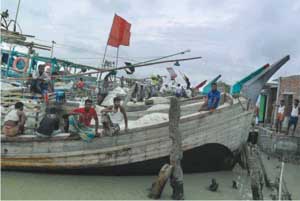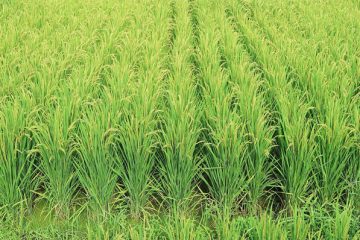 The ongoing hilsa season sees poor netting of the popular fish in the coastal waters, much to the frustration among fishermen and traders.
The ongoing hilsa season sees poor netting of the popular fish in the coastal waters, much to the frustration among fishermen and traders.
Fishermen’s families are passing hard days as the catches are not sufficient even to recover the cost of deep sea trips on trawlers for the purpose, according to our correspondent in Patuakhali.
Over 500 trawlers from coastal districts of Patuakhali and Barguna got engaged in catching hilsa in the deep sea after the end of ban period of hilsa catching but this year the catches are much less than expectation.
May to October is generally considered the hilsa catching season in Bangladesh.
“We went to the deep sea with 14 fishermen and came back to the shore on Friday after 12 days. We were able to catch only 1.5 maunds of hilsa that sold for Tk 27,000 whereas we have to spend about Tk 80,000 in a trip. During this time last year we caught 25 to 30 maunds of hilsa per trip,” said Abdul Jabbar Mia, 40, a fisherman of Mohipur in Kalapara upazila.
Abdus Sobhan and Edris Mia of Char Anda under Galachipa upazila said they are now worried about payment of loan that they took from a mohajon (money lender) as they are not getting hilsa as per expectation during the running season.
Fishermen Mojibur Rahman and Razzak of Char Biswas said they did not see such crisis of hilsa in last 25 years.
Hilsa might have changed their place in the sea due to food crisis or rise in sea level as a result of siltation, they said.
Anwar Hossain, a hilsa wholesaler of Moudovi area in Galachipa upazila, said they expected netting of huge quantities of large size hilsa fish due to favourable weather this season but they are frustrated.
“Poor netting of hilsa has led to its high price this season. The fish weighing 800 grams to 1 kg each is selling for Tk 17,000 to 18,500 per maund while the price for the amount of hilsa weighing 600 to 800 grams each varies between Tk 13,000 to 14,000,” said Md Elias, owner of Sahana Fish Traders, a hilsa warehouse at Mohipur.
“My experience says that huge hilsa is netted if sea is very rough. During this time last year at least 200 maunds of hilsa came to my warehouse daily but now we are getting only 25 to 30 maunds,” he said.
Fazlu Gazi, president of fishing trawler owners association at Mohipur, said fishermen are coming back with almost empty trawlers although fishermen passed very busy time with hilsa catching during this period in previous years.
Local fishermen last week arranged a milad mahfil at Mohipur fish landing station and prayed for good catches of hilsa.
In Barisal, poor catch of hilsa has become a cause of concern for fishermen, fish traders and owners of ice mills, reports our correspondent.
Price of the fish has also shot up beyond the purchasing capacity of the common people due to poor netting.
Ajit Kumar Das, president of Barisal Zilla Matsya Aratder Samity said, for the last few years hilsa traders are facing this acute crisis of the fish.
The number of Samity members has come down to only 60 this year from 138 last year as a large number of hilsa traders of this region have shut their business, he said.
There are a dozen big hilsa centres in Barisal region on Barisal Port Road and Alipur, Mohipur, Patherghata, Monpura, Hizla, Ilisha, Patherhat and Pirojpur Machghat areas.
“They are now empty. Wholesalers are doing seasonal fruit business in their hilsa centres,” said Ajit.
Fishermen said thousands of fishing trawlers were engaged in hilsa fishing in Kuakata, Kalapara, Galachipa, Daulatkha, Borhanuddin, Tajumuddin, Charfession, Manpura, Ilisha, Veduria Monpura, Hatiya, Ramgati, coastal areas and branches of Meghna, Padma, Arial Kha, Kirtonkhola, Tentulia, Andharmanik, Payera, Ramnabad and Agunmukha river. But almost all of them are now coming back because of poor catches.
Anwar Mia, a fisherman who recently returned from sea after a 10-day trip spending Tk 2 lakh, said they caught only two maunds of hilsa. “Around this time last year we caught not less than 100 maunds per trip,” he said.
Meanwhile, prices of hilsa have shot up in Barisal wholesale hilsha market. Small to medium size hilsa were being sold at Tk 20,000 to 25,000 per maund while big size at Tk 28,000 to 40,000 per maund, traders said.
Courtesy of The Daily Star




